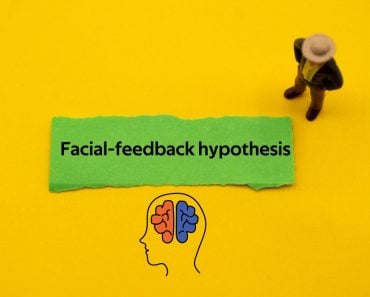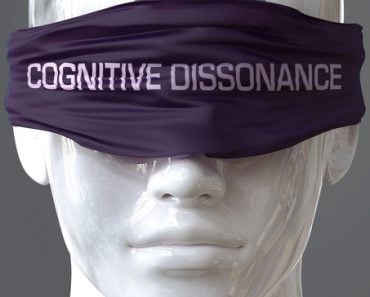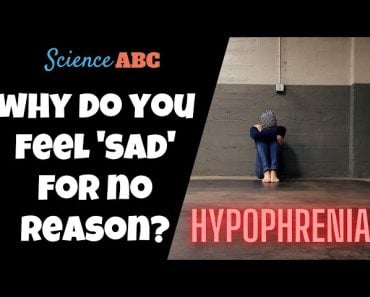Table of Contents (click to expand)
Hedonic adaptation (also referred to as the hedonic treadmill) refers to a process by which people get used to their situations, as the emotional effects of both positive and negative events diminish over time.
Happiness underlies everything we do, from childhood to the golden years of our lives. We often imagine that we would be happy if we got accepted into a certain college, landed our dream job, married our soul mate, etc. We constantly connect the events in our lives and the objective outcomes of our goals to our happiness.
Even so, happiness is short-lived. Despite getting what we want, we may not (in fact, do not) stay happy for a very long time!

We’re definitely overwhelmed by happiness when good things happen to us, but it’s only a matter of time before our emotions fade. This occurs due to a psychological process called hedonic adaptation.
Recommended Video for you:
What Is Hedonic Adaptation?
Hedonic adaptation refers to a process by which people get used to their situations, given that the emotional effects of both positive and negative events will wane with time.
For example, although we would expect a lottery winner to be much happier than the average person, or someone who became paralyzed in an accident to be relatively miserable, research shows that this doesn’t hold true in the long run. While both individuals were initially greatly affected by their respective situations, lottery winners and accident victims showed more or less the same level of happiness after a year following their life-changing event.
People can experience hedonic adaptation in response to one-time events (e.g., a break-up), or recurring events (e.g., having to undergo chemotherapy sessions every month). They will hedonically adapt to their situations so long as their situations remain constant. However, if the heartbroken person finds new love, or if the frequency of chemotherapy sessions changes, they will experience an entirely new adaptation process.
In short, hedonic adaptation reflects our tendency to bounce back to a baseline level of happiness, despite all the ups and downs in life. Psychologists also call this the hedonic treadmill since, despite seeking new pleasures in order to increase our levels of happiness, we’re doomed to eventually return to our old levels of happiness.
Hedonic adaptation might look like a bad thing to you, but on the contrary, it proves to be a vital process. It helps us maintain the emotional balance of our mind, preventing us from becoming overwhelmed by an intolerable amount of emotional information.
It is only because of the weakening of old emotions that we’re able to pay more attention to new stimuli that have an immediate bearing on our present. By discriminating between less important (past) stimuli and more important (present) stimuli, hedonic adaptation helps us function properly and keeps us emotionally sane.
Like Celine says in the 2004 movie Before Sunset: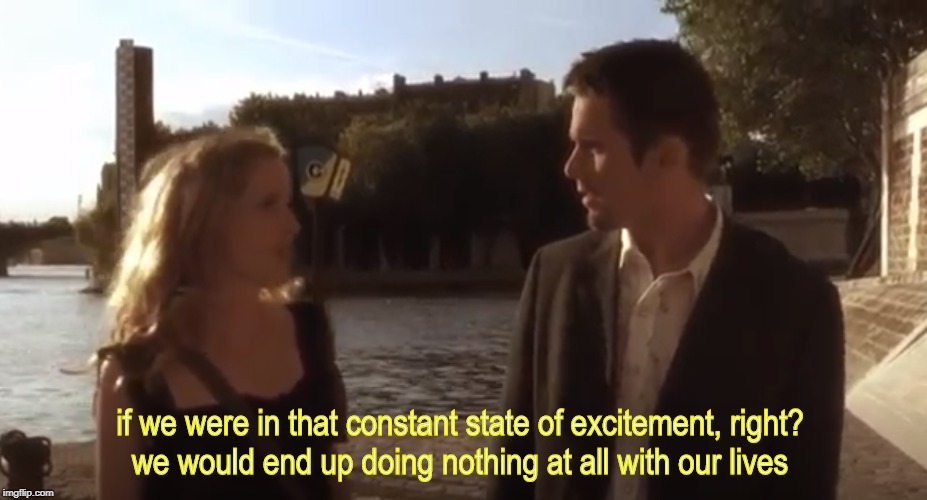
This can be said not only about positive emotions like happiness, but also about the negative ones, such as sorrow, anger and guilt. Hedonic adaptation gives us the capacity to adapt to almost any circumstance in life and move forward by leaving the past behind.
However, a logical question at this point is: If we all bounce back to a certain base level of happiness, why are some people happier than others?
What Is The Happiness Set Point?
The general, baseline level of happiness that we return to is called our ‘happiness set point’, which is unique to each of us. People with higher set points are naturally happier than others; these are the people who see the glass as half full. Then there are those who have lower happiness set points and, therefore, are generally pessimistic about everything in life.
Research shows that our set points are genetically determined; we’re all born with a certain level of happiness, to which we are condemned to return, regardless of the events in our lives. In the study, identical twins, including those raised miles apart, were found to have similar levels of happiness, whereas fraternal twins, despite being raised together, showed a great difference in their levels.
Does this mean that we’re stuck with a fixed set point of happiness that won’t let us be any happier? Is there any way we can change our set point?
How To Be Happy
An interesting story in Greek mythology pairs very well with our undying urge to seek out more happiness. Sisyphus, a notorious king of Corinth, was condemned by Zeus to the eternal punishment of rolling a huge boulder up a mountain. Every time he was about to reach the top, the boulder mercilessly rolled back down, forcing him to repeat the entire exercise… for eternity! Our hunt for happiness is an unending endeavor, just like the curse of Sisyphus.
Consciously chasing happiness can prove to be counterproductive and may only drive it further away from us. Moreover, there is no point in trying to change our set point, since it’s biologically determined.
Does this mean that it’s impossible to become any happier?
Fortunately, our set point accounts for only fifty percent of all the determinants of happiness. The other half of the happiness pie is taken up by life circumstances and intentional activity (Source).
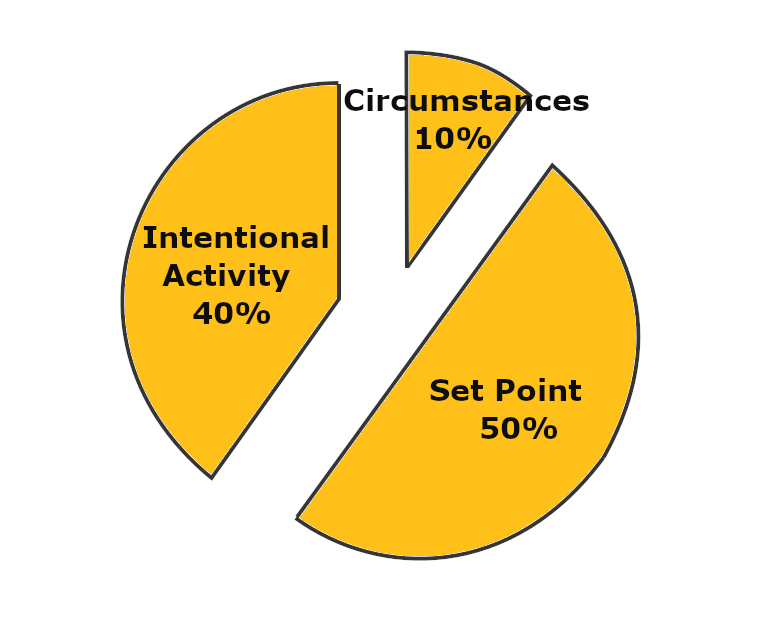
Our life circumstances, which include the basic background of our life (e.g., gender, ethnicity, physical appearance, income, health, marital status, etc.) account for a mere 10% of our happiness.
Researchers believe that changing these variables does little to increase our overall happiness. Although we often feel that we would be happier if we had more money, for example, it would take us very little time to get used to our new standard of living, in the event that we somehow got rich. This explains why being rich or objectively attractive doesn’t always make you happier. Assuming that one’s basic needs are met, life circumstances do not decide our happiness in a major way, which is a good thing! Imagine having to change our appearance, marital status or income levels to ensure happiness!
Rather, the key to happiness lies in the activities in which we intentionally engage; it lies in the thoughts we choose to think and in the way we choose to behave. It has been proven that intentionally choosing to do certain things goes a long way towards increasing our overall happiness and satisfaction. The most important things on the to-intentionally-do list are:
Gratitude
Being grateful for life, appreciating all that it gives us, and saying ‘thank you’ is very beneficial for our happiness. Focusing our attention on the positive things around us not only helps our emotional health, but also improves our physical health. A study found that people who wrote gratitude journals once a week reported a considerable increase in their overall wellbeing.
Gratitude undoes the adaptation process by bringing all the positive things to the center of our attention. It brings forth all the good things we had adapted ourselves to, thereby letting us appreciate them more wholly.
Moreover, expressing gratitude to the people in our lives (through spoken words or by writing gratitude letters) strengthens the bonds between us, leading to happier, stronger and more meaningful relationships.

Positive Visualization
Visualizing a future of living our dreams is another way to increase our happiness level. Envisioning ourselves ten years down the line, having achieved our goals, being happy, loved and successful gives us confidence that our most cherished goals are actually within reach and our dream life is just around the corner. This activity also creates a positive image of ourselves in our minds and gives us a structured sense of purpose.
Performing Acts Of Kindness
Selfless acts of kindness are often seen as time-consuming and unrewarding. However, helpful behavior is beneficial to both the receiver and the giver. When we help others, we see ourselves in a more positive light. Instead of seeing ourselves as lazy, indifferent and unkind people, we change our self-perception to being kind, considerate and capable people. We understand the challenges faced by others and feel empathy for them. Moreover, doesn’t it simply feel good to see a person smile and know that it’s because of us?
In conclusion, we must remember to appreciate the little things and simply let life take its course. As the famous quote goes: “Happiness is as a butterfly that, when pursued, is always beyond our grasp, but if you sit down quietly, it may alight upon you.”
References (click to expand)
- Hedonic Adaptation to Positive and Negative Experiences - recwellness.uccs.edu
- S Frederick. Hedonic Adaptation - Carnegie Mellon University. Carnegie Mellon University
- Jaime L. Kurtz And Sonja Lyubomirsky - Toward A Durable Happiness - CiteSeerX
- Luhmann, M., & Intelisano, S. (2018). Hedonic adaptation and the set point for subjective well-being. Handbook of well-being. - Academia.edu


